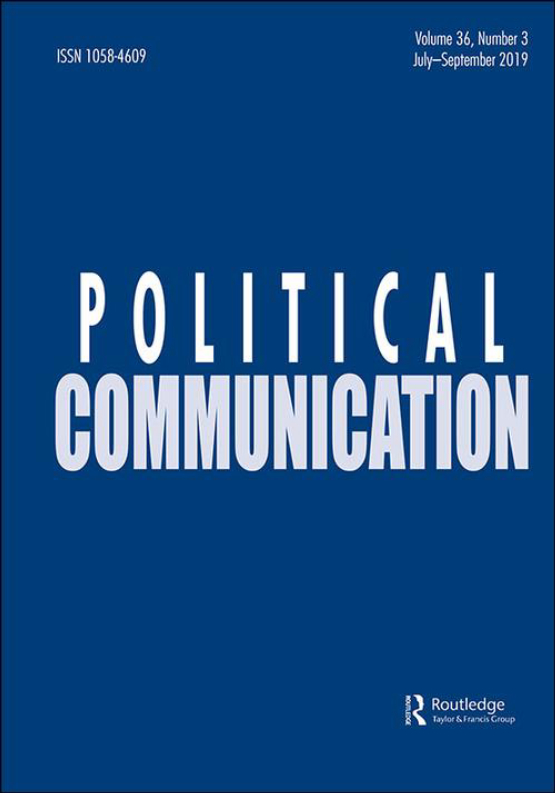Submit a Manuscript to the Journal
Political Communication
For a Special Issue on
Communicating Democratic Decline & Resilience
Manuscript deadline

Special Issue Editor(s)
Regina Lawrence,
University of Oregon, USA
rgl@uoregon.edu
Communicating Democratic Decline & Resilience
The editorial team of Political Communication is launching a call for papers to be included in a special issue on Communicating Democratic Decline & Resilience.
Democracy is undergoing profound challenges in many parts of the world. Substantive declines in democratic governance have occurred in established democracies, semi-democracies and hybrid regimes. A growing body of political communication scholarship is grappling with democratic erosion, although still unevenly. The field needs to rethink theories and basic assumptions in order to better address connections among illiberal discourses, disrupted public spheres, and weakened democratic institutions and processes (see Knüpfer et al 2024). This turning point in our field is particularly important, given that contemporary illiberal regimes and authoritarian transitions rely more on communication practices than on coercion (Guriev & Treisman 2022; Štětka & Mihelj 2024a, 2024b).
This special issue aims to illuminate the political communication dynamics at work in democratic decline—and in democratic resilience. Key dynamics needing empirical exploration and theoretical explication include illiberal public spheres, disruptive communication codes, pressures on the legacy press, networked propaganda, and their roles in democratic erosion, illiberal democratic transitions, autocratic breakthroughs, and democratic resilience. In particular, we invite submissions that focus on ways communication practices and systems “can alternately erode or legitimize other political institutions,” contributing to either democratic vitality or decline (Bennett and Kneuer 2023, p. 5).
The critical role of communication in the decline of democracy is highlighted by recent work on “the illiberal public sphere” (Štětka & Mihelj 2024a, 2024b). Transformations of communication logics, media content, and cultural themes often come “after (certain kinds of) populist politicians rise to positions of power, and specifically after they start using their leverage to undermine democratic institutions, including independent media” (Štětka & Mihelj 2024b, 266). These approaches draw our attention toward the communication dynamics that drive (and contest) democratic decline.
Related questions are suggested by work from adjacent fields. For example, analyzing the demise of democracy in post-communist regimes such as his native Hungary, analyst Bálint Magyar (2016) describes three stages: autocratic attempt, autocratic breakthrough, and autocratic consolidation. According to many interpretations, autocratic breakthrough occurs once conventional means of resisting and reversing an attempted autocratic power grab are no longer possible or effective, because the structures of government, bureaucracy, media, and civil society themselves have been transformed.
How can we know when a society has arrived at these decisive moments for democracy? How can we assess the responses of publics, parties, movements and institutions that may help slow or reverse democratic decline? Answers to these questions point to processes of political communication. Members of society come to “know” autocratic breakthrough and other political transitions by how they are performed in expressive acts by powerful political actors; by how they are documented and explained (or overlooked or misunderstood) by journalists, activists, scholars, and other observers; and how they are collectively called out and resisted by networks of political actors, communities, and social movements.
This special issue aims to illuminate the communication processes, institutions, organizations, and actors at work as liberal democratic polities give way to or resist the rise of illiberalism. We invite studies including: comparative work that shows how anti-democratic and illiberal dynamics play out similarly or differently across nations; studies that document and theorize democratic resistance and reclamation; and research that integrates the institutionalist perspectives of political science with various communication perspectives on media, networks and discourse codes (see Bennett and Livingston, 2024).
References
Bennett, W.L. & Kneuer, M. (2023). Communication and democratic erosion: The rise of illiberal public spheres. European Journal of Communication 1-20.
Bennett, W. L. & Livingston, S. (2025). Platforms, Politics, and the Crisis of Democracy: Connective Action and the Rise of Illiberalism. Perspectives on Politics, 1-20.
Guriev, S. & Treisman, D. (2022). Spin dictators: The changing face of tyranny in the 21st century. Princeton University Press.
Knüpfer, C. Jackson, S.J., & Kreiss, D. (2024). Political communication research is unprepared for the far right. Political Communication 41(6): 1009–1016.
Magyar, B. (2016). Post-communist mafia state: The case of Hungary.
Submission Instructions
This special issue will comprise approximately 8 articles (each around 8,000 words in length). We aim to curate a special issue of broad interest to our readership and members of the political communication divisions in the ICA and APSA. The special issue will be open to both conceptual and empirical studies—ideally, papers that do both—particularly work that helps our field to theorize core democratic and/or anti-democratic communication processes. We welcome an array of qualitative and quantitative methods.
Manuscripts should include a clear account of theories/concepts engaged with, research question/hypotheses, methods employed, and clear indications of how the study illuminates political communication dynamics related to the special issue theme. Authors should refer to the journal’s Instructions for Authors for a full list of submission requirements.
The deadline for the submission of proposals is December 15 2025. Manuscripts should be submitted via the journal’s Scholar One submission portal. Manuscripts will be considered by the editorial team of Political Communication and authors of selected manuscripts will be informed by 15 January 2026. Inquiries may be addressed to the Editor, Regina Lawrence, at rgl@uoregon.edu.

